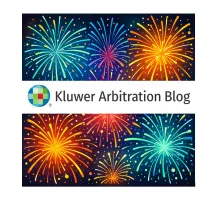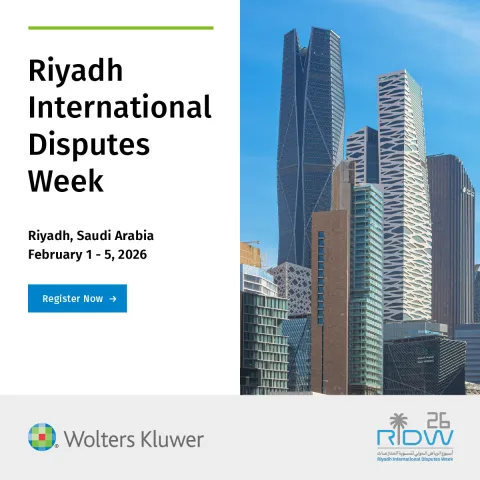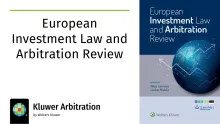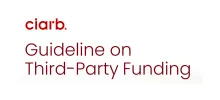Interviews with Our Editors: In Conversation with Niamh Leinwather, Secretary General of the Vienna International Arbitral Centre
November 12, 2025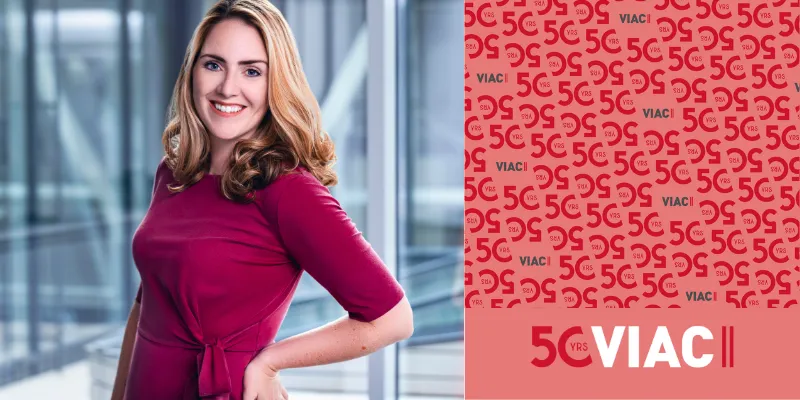
The year 2025 marks the golden jubilee of the Vienna International Arbitral Centre (“VIAC”), while as of 1 January 2025 a new version of its Rules of Arbitration and Mediation 2021 (the “Vienna Rules”) entered into force. We invited the VIAC Secretary General, Ms. Niamh Leinwather to share her insights on the new rules and the vision for VIAC. Ms. Leinwather has led the VIAC Secretariat since January 2022. Prior to joining VIAC, she practiced international arbitration with leading law firms in Vienna.
Ms. Leinwather, a very warm welcome to our Interviews series!
Thank you for having me, it is an absolute pleasure.
As VIAC celebrates its golden jubilee, what do you consider the most significant milestones in its evolution since 1975?
This year has been incredibly special for VIAC, there has been such momentum within the Secretariat and Board all year building up to our special celebration in October. I am so grateful to mark VIAC’s 50th anniversary in my current role.
There’s been a light-hearted joke going around suggesting I am celebrating my own 50th birthday alongside VIAC, which I would like to clarify is somewhat premature!
In preparation for this milestone, we have taken time to reflect as an institution. I have been with VIAC for three and a half years, so my perspective only captures a portion of its full history. Speaking with my predecessors and long-serving Board members has been especially rewarding. Moments like these offer a chance to pause and appreciate the path that has been travelled, and this reflection helps provide clarity for the future – for the next 50 years. All of these conversations have been carefully curated into a short documentary (see Part I, Part II, and Part III).
Looking back at our foundation, the Vienna Rules — first adopted in 1975 — were instrumental in establishing VIAC’s procedural strength. Their many revisions over time have reflected our agility and commitment to the legal community. The introduction of mediation rules in 2013 expanded our alternative dispute resolution offering, while the launch of the CDRC competition in 2015 added another dynamic layer. In 2018, VIAC gained the authority to handle domestic cases, and in 2021, the Vienna Investment Arbitration Rules were released.
One of our founding pillars, the late Werner Melis, played a vital role in shaping the Vis Moot — a cornerstone event in international arbitration. Hosting the first hearings in VIAC’s premises was a defining moment, and today the Vis Moot continues to open doors for the next generation of practitioners.
Among other notable achievements: we launched our digital case management platform in 2021, making VIAC a trailblazer on this front. The VIAC Portal has streamlined communication and secured our position as a forward-thinking institution.
Looking ahead, I’m filled with anticipation for what the coming decades hold. While I may not be around for VIAC’s centenary, I already envision what that celebration could look like — and that vision continues to drive me and my fantastic team forward.
- What do you believe has allowed VIAC to maintain its relevance, and what steps are being taken to ensure it remains one of the leading arbitration institutions in the coming decades?
VIAC’s relevance stems from its persistent commitment to excellence, focus on developing regional expertise, and cost-efficient offering. We have always balanced tradition with innovation—whether through rule revisions, digitalisation, or outreach initiatives. I believe this is why users have placed their trust in us. All of this has been achieved through our exceptional people - a dedicated VIAC Board and an extremely invested VIAC Secretariat!
Looking ahead, we continue to invest in our people and in thought leadership to ensure that we stay at the forefront of institutional arbitration. Our diverse Board members of renowned experts are the backbone of the institution. I am extremely grateful for the past three years with Nikolaus Pitkowitz and look forward to the leadership of President-Elect Franz Schwarz, confident his expertise and vision will lead the institution to new horizons.
I am also extremely proud of my Secretariat. In addition to the Deputy SG (Anna Förstel-Cherng) we recently created a new position of a Managing Counsel (Elisabeth Vanas-Metzler) focusing on knowledge management, which sends a strong signal to the market that we are committed to providing premium services. Our case management team is deeply service-oriented, always putting the needs of parties and arbitrators at the forefront of their daily work. These forces combined with our expert focus groups, our Legal Tech Think Tank and in particular the VIAC CAN network, will ensure that VIAC strives ahead in developing and expanding alternative dispute resolution while maintaining excellence and quality.
- Held in conjunction with VIAC’s 50th anniversary, the 2025 Vienna Arbitration Days centered on the theme “Orchestrating Efficiency in Arbitration.” In light of the findings of the Queen Mary University of London Arbitration Survey in partnership with White & Case, which spotlighted inefficiencies such as overly adversarial advocacy, poor case management, and excessive documentation, did the conference offer any concrete proposals or reflections on how to streamline arbitral proceedings ?
Absolutely! We had the honour of having Cavinder Bull SC as our Keynote speaker who set the stage for the topic of “Orchestrating Efficiency in Arbitration”. He spoke about “rediscovering the simplicity of arbitration”, which resonated deeply with the community. Cavinder stated that the essence of arbitration lies in clarity and efficiency—and pleaded that we return to that. He argued that we need a new wave of confident, pragmatic arbitrators who will set firm boundaries on submissions and timelines, stripping away needless complexity. In addition, he maintained that we need thoughtful counsel who understand that precision carries more weight than verbosity: concise memorials speak louder than lengthy treatises, and targeted post-hearing briefs that address tribunal concerns are far more persuasive than rehearsing arguments. I would love to see – even a fraction of what Cavinder Bull discussed during his Keynote put into practice!
- The 2024 VIAC Annual Report also provides that the average duration of arbitration proceedings is 12 months, a reasonably efficient process. However, there appears to have been a decline in the use of expedited proceedings. What do you attribute this trend to, and is VIAC considering any changes to encourage greater uptake?
12 months sounds almost too good to be true – right? We are particularly proud of the fact that the average duration of an arbitration proceedings at VIAC is 12 months. The reasons we are so successful on this front is twofold. First, last year the average duration between the filing of the Statement of Claim and the handover of the file to the Arbitral Tribunal was only four months. This shows that VIAC is extremely effective at the outset of the proceedings and during the constitution of the arbitral tribunal; a testament to the hard-working case management team at VIAC. Second, we have a very strict award monitoring system in place, which supports arbitrators at the end of the process to deliver their awards on time.
I consider our expedited procedure under Article 45 robust, they foresee an opt-in method. As an institution, we strongly encourage the use of expedited proceedings, if we consider the dispute suitable. However, if parties have not agreed in advance, a subsequent agreement post commencement of the dispute can prove difficult. I would not rule out that VIAC may consider exploring an opt-out mechanism going forward. However, while duration of proceedings is important to users, we see from the statistics it is not the only factor they consider.
- Could you share insights into the recent trends in VIAC's caseload, including the types of disputes and the geographic diversity of parties involved?
2024 was another great year for VIAC in terms of caseload. It is encouraging to see a constant growth in case numbers and reassuring that parties continue to place their trust in our institution. The figures from our 2024 VIAC Annual Report reveal a diverse caseload, both in terms of dispute types and party geography. This is consistent with previous years.
Nearly 50% of cases involved dispute values between €14,000 and €500,000, underscoring VIAC’s accessibility to small and medium-sized enterprises (“SMEs”). Our competitive fee structure, and digital tools make VIAC particularly attractive to SMEs seeking high-quality yet affordable dispute resolution. Simultaneously, we also administered cases with very high amounts in dispute bringing our overall amount in dispute to a new time record – this is equally encouraging that users have entrusted VIAC to administer disputes with high value claims.
Parties hailed from over 30 jurisdictions, with strong representation from Central and Eastern Europe (“CEE”) and Southeastern Europe (“SEE”). This was also reflected in our diversity of arbitrator appointments with 38 percent more arbitrators coming from CEE/SEE than in the previous year. This increase shows our commitment to the development of regional expertise in hard facts!
- In April 2024, the Austrian Supreme Court issued a landmark decision regarding the arbitrability of shareholder disputes, prompting VIAC to amend the Vienna Rules and introduce new provisions tailored for corporate disputes. Could you elaborate on the scope and significance of these amendments?
When this decision was rendered, I got a call on a Saturday morning from a member of the National Advisory Board drawing this to my attention. They immediately offered to set up a working group to make the necessary amendments to our model clauses and rules. This is when you know that you have the right people involved in your institution!
In essence, the Supreme Court found that shareholder disputes are only arbitrable if all shareholders are properly involved and informed. The result of the Saturday morning call was a working group that drafted a dedicated model clause for articles of association that incorporate certain procedural safeguards as well as Annex 7: Supplementary Rules for Corporate Disputes. The procedural safeguards include for instance mandatory notifications, joinder rights, and inclusive tribunal constitution. These amendments uphold enforceability and reflect VIAC’s agility in aligning with jurisprudential developments.
- You have frequently emphasised the importance of improving gender parity in arbitrator appointments and creating accessible pathways for the next generation of practitioners (see notably remarks made for the Women in Law Conference and for the International Women's Day). What concrete steps has VIAC taken to promote diversity and inclusion within its arbitration framework?
I seem to be getting a reputation for turning every panel discussion on the conference circuit into a debate about gender diversity. I believe this is a topic we should not shy away from. Diverse decision makers make for better awards. We owe it to the next generation to address it at every opportunity!
I truly believe that diversity is not just a value—it’s a practice. VIAC signed the ERA Pledge in 2016 and I am very proud of the fact that we also live this pledge! In 2024, 64% of arbitrators appointed by VIAC were women, compared to 37% overall. While these statistics are positive, there is still much work to be done, in particular in relation to party appointments. We actively encourage parties to consider diverse candidates – proactively pointing arbitrators to the ERA Pledge and to our list of practitioners on our new(!) website that reflects gender, regional and generational breadth. This not only applies to arbitrator appointments but also to any events that we organise or working groups that we set up. I am also a member of the Board of ArbitralWomen, with which VIAC has now signed a cooperation agreement.
- Looking ahead, what is your vision for VIAC, and how do you plan to address emerging challenges in international arbitration?
I have so many ideas for VIAC’s growth! In fact, there is often a shudder in my team when I come to the office and announce, “I have an idea”! I truly believe that VIAC has huge potential. It is strategically perfectly positioned in Europe offering premium dispute resolution services without the premium price tag.
My focus will always be first and foremost on a top-class case management service. Parties are paying good money for this “private” form of dispute resolution. Often it may be their entire investment on the line. They have entrusted us with this and deserve to get the best service possible. We never settle for mediocre, and it is fantastic to see how our case management has evolved over the last three years.
I am also very eager to grow the VIAC CAN (Community Ambassador Network)—an initiative fostering an inspiring network of rising stars in arbitration and a testament to our commitment to inclusivity, innovation, and expansion across emerging markets. I am confident through this excellent network that we have curated, we have huge potential.
We also play an important role in thought-leadership. We live in turbulent times; as individuals we are constantly required to be flexible and adapt to new norms; dispute resolution is no different. We face challenges in digitalisation with the rapid growth of artificial intelligence – this is a development we have to embrace and there is huge potential in our sector. We are ready for this at VIAC and our Legal Tech Think Tank has already produced a Note on AI. We even used an AI tool to create a podcast discussing the AI Note, which is worth a listen. We are currently developing another AI note that I think will be particularly helpful for arbitrators in their practice so watch this space!
Ms. Leinwather, thank you for your time and your valuable perspectives!
Thank you for this opportunity, it has been a real pleasure – I would be very happy to do another interview when I actually turn 50! We still have a few more years!
This interview is part of Kluwer Arbitration Blog’s “Interviews with Our Editors” series. Past interviews are available here.
You may also like

